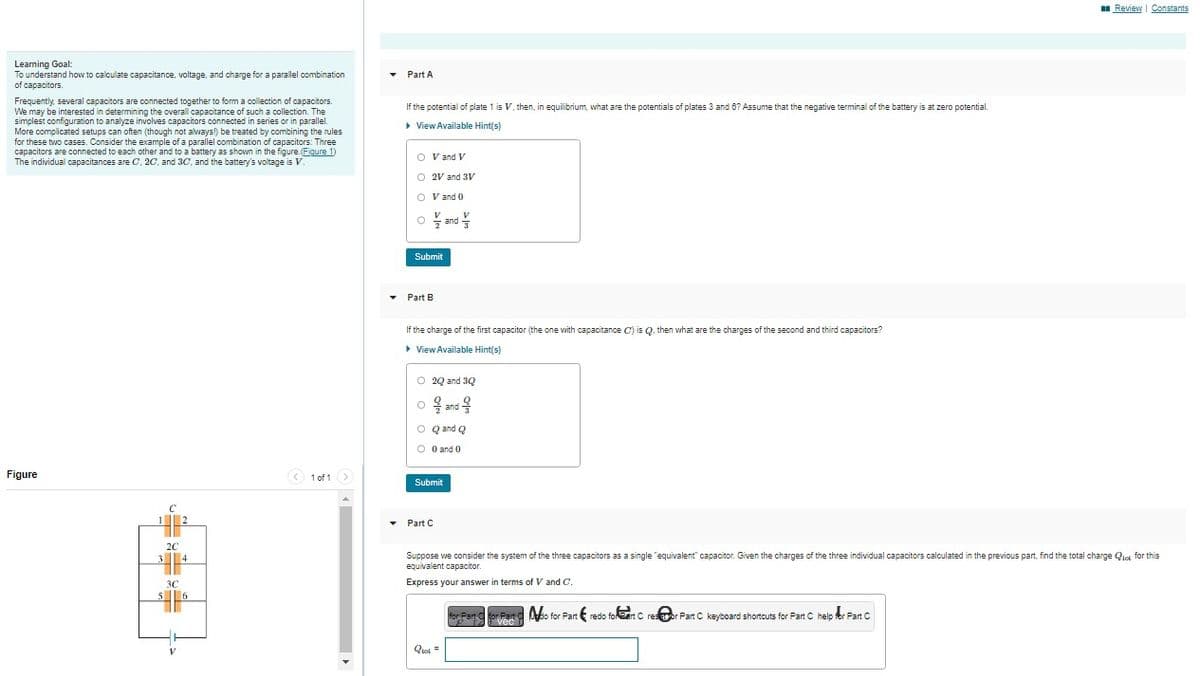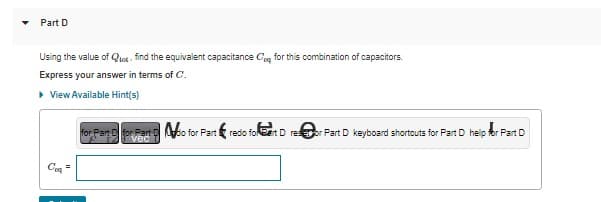Learning Goal: To understand how to calculate capacitance, voltage, and charge for a parallel combination of capacitors. Frequently, several capacitors are connected together to form a collection of capacitors. We may be interested in determining the overall capacitance of such a collection. The simplest configuration to analyze involves capacitors connected in series or in parallel. More complicated setups can often (though not always be treated by combining the rules for these two cases. Consider the example of a parallel combination of capacitors: Three capacitors are connected to each other and to a battery as shown in the figure. Eigure 1) The individual capacitances are C, 2C, and 3C, and the battery's voltage is V. Figure 12 ▬ 20 34 3C 56 <1 of 1 ▾ Part A If the potential of plate 1 is V. then, in equilibrium, what are the potentials of plates 3 and 6? Assume that the negative terminal of the battery is at zero potential. ▸ View Available Hint(s) O V and V 2V and 3V V and 0 O and Submit ▾ Part B If the charge of the first capacitor (the one with capacitance C) is Q. then what are the charges of the second and third capacitors? ▸ View Available Hint(s) 20 and 3Q O Q and Q O 0 and 0 Submit ▾ Part C and Quot = Suppose we consider the system of the three capacitors as a single "equivalent capacitor. Given the charges of the three individual capacitors calculated in the previous part, find the total charge Quo for this equivalent capacitor. Express your answer in terms of V and C. for Pan for Pato for Part o for Pant Review | Constants redo for C redo foran C resor Part C keyboard shortcuts for Part C help for Part C
Learning Goal: To understand how to calculate capacitance, voltage, and charge for a parallel combination of capacitors. Frequently, several capacitors are connected together to form a collection of capacitors. We may be interested in determining the overall capacitance of such a collection. The simplest configuration to analyze involves capacitors connected in series or in parallel. More complicated setups can often (though not always be treated by combining the rules for these two cases. Consider the example of a parallel combination of capacitors: Three capacitors are connected to each other and to a battery as shown in the figure. Eigure 1) The individual capacitances are C, 2C, and 3C, and the battery's voltage is V. Figure 12 ▬ 20 34 3C 56 <1 of 1 ▾ Part A If the potential of plate 1 is V. then, in equilibrium, what are the potentials of plates 3 and 6? Assume that the negative terminal of the battery is at zero potential. ▸ View Available Hint(s) O V and V 2V and 3V V and 0 O and Submit ▾ Part B If the charge of the first capacitor (the one with capacitance C) is Q. then what are the charges of the second and third capacitors? ▸ View Available Hint(s) 20 and 3Q O Q and Q O 0 and 0 Submit ▾ Part C and Quot = Suppose we consider the system of the three capacitors as a single "equivalent capacitor. Given the charges of the three individual capacitors calculated in the previous part, find the total charge Quo for this equivalent capacitor. Express your answer in terms of V and C. for Pan for Pato for Part o for Pant Review | Constants redo for C redo foran C resor Part C keyboard shortcuts for Part C help for Part C
Physics for Scientists and Engineers, Technology Update (No access codes included)
9th Edition
ISBN:9781305116399
Author:Raymond A. Serway, John W. Jewett
Publisher:Raymond A. Serway, John W. Jewett
Chapter26: Capacitance And Dielectrics
Section: Chapter Questions
Problem 26.10OQ: (i) A battery is attached to several different capacitors connected in parallel. Which of the...
Related questions
Question
100%

Transcribed Image Text:Learning Goal:
To understand how to calculate capacitance, voltage, and charge for a parallel combination
of capacitors.
Frequently, several capacitors are connected together to form a collection of capacitors.
We may be interested in determining the overall capacitance of such a collection. The
simplest configuration to analyze involves capacitors connected in series or in parallel.
More complicated setups can often (though not always!) be treated by combining the rules
for these two cases. Consider the example of a parallel combination of capacitors: Three
capacitors are connected to each other and to a battery as shown in the figure. (Figure 1)
The individual capacitances are C, 2C, and 3C, and the battery's voltage is V
Figure
0-8-8-
5
2C
3C
2
4
6
< 1 of 1 >
▼
Part A
If the potential of plate 1 is V, then, in equilibrium, what are the potentials of plates 3 and 6? Assume that the negative terminal of the battery is at zero potential.
▸ View Available Hint(s)
O V and V
O 2V and 3V
O V and 0
V
O and
Submit
▾ Part B
If the charge of the first capacitor (the one with capacitance C) is Q, then what are the charges of the second and third capacitors?
▸ View Available Hint(s)
O 20 and 30
O å ਨੂੰ
and
O Q and Q
O 0 and 0
Submit
V
Part C
Qual =
Suppose we consider the system of the three capacitors as a single "equivalent" capacitor. Given the charges of the three individual capacitors calculated in the previous part, find the total charge for this
equivalent capacitor.
Express your answer in terms of V and C.
Review | Constants
for Part C or Part Mo for Part redo for eart Crestor Part C. keyboard shortcuts for Part C help for Part C
vec

Transcribed Image Text:Part D
Using the value of Quo find the equivalent capacitance Coq for this combination of capacitors.
Express your answer in terms of C.
▸ View Available Hint(s)
Coa
for Part for Parto for Part&redo for at D reor Part D keyboard shortcuts for Part D help for Part D
vec
Expert Solution
This question has been solved!
Explore an expertly crafted, step-by-step solution for a thorough understanding of key concepts.
This is a popular solution!
Trending now
This is a popular solution!
Step by step
Solved in 4 steps

Knowledge Booster
Learn more about
Need a deep-dive on the concept behind this application? Look no further. Learn more about this topic, physics and related others by exploring similar questions and additional content below.Recommended textbooks for you

Physics for Scientists and Engineers, Technology …
Physics
ISBN:
9781305116399
Author:
Raymond A. Serway, John W. Jewett
Publisher:
Cengage Learning

Principles of Physics: A Calculus-Based Text
Physics
ISBN:
9781133104261
Author:
Raymond A. Serway, John W. Jewett
Publisher:
Cengage Learning

Glencoe Physics: Principles and Problems, Student…
Physics
ISBN:
9780078807213
Author:
Paul W. Zitzewitz
Publisher:
Glencoe/McGraw-Hill

Physics for Scientists and Engineers, Technology …
Physics
ISBN:
9781305116399
Author:
Raymond A. Serway, John W. Jewett
Publisher:
Cengage Learning

Principles of Physics: A Calculus-Based Text
Physics
ISBN:
9781133104261
Author:
Raymond A. Serway, John W. Jewett
Publisher:
Cengage Learning

Glencoe Physics: Principles and Problems, Student…
Physics
ISBN:
9780078807213
Author:
Paul W. Zitzewitz
Publisher:
Glencoe/McGraw-Hill


College Physics
Physics
ISBN:
9781285737027
Author:
Raymond A. Serway, Chris Vuille
Publisher:
Cengage Learning

College Physics
Physics
ISBN:
9781305952300
Author:
Raymond A. Serway, Chris Vuille
Publisher:
Cengage Learning